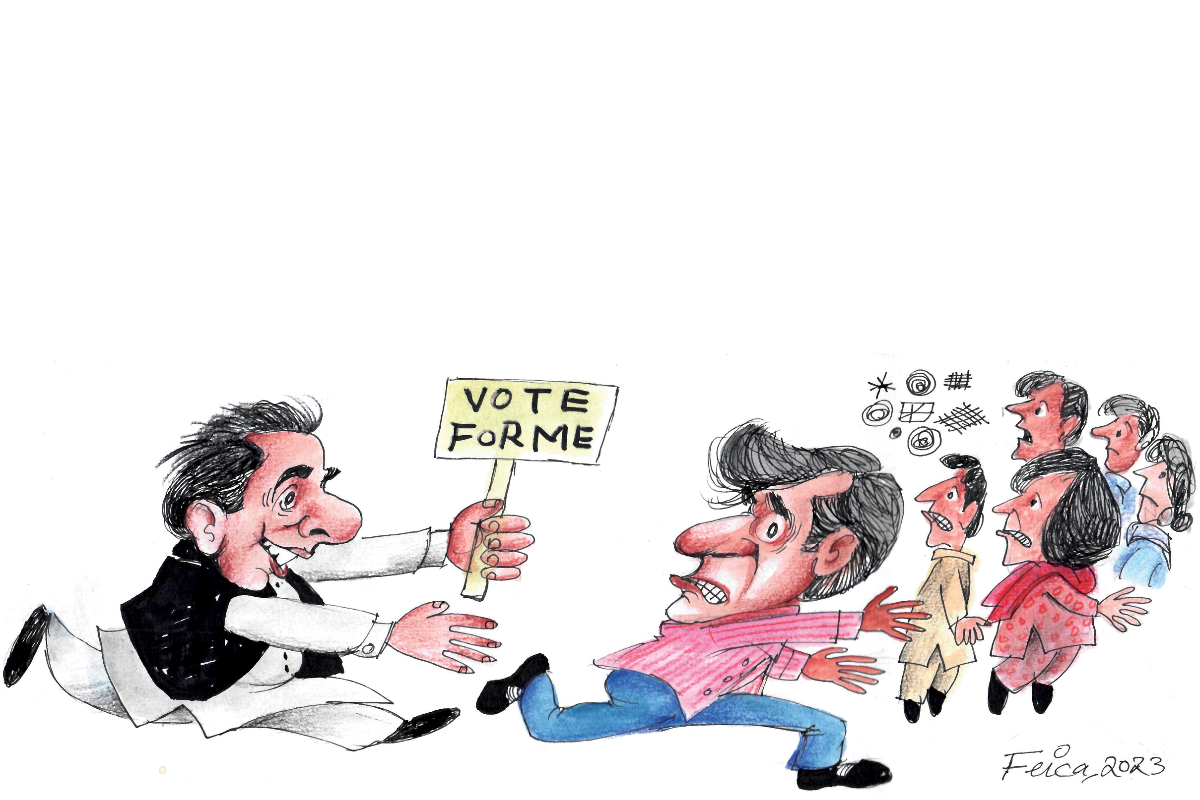
To vote or not to vote?
People of Karachi protested silently by abstaining from voting
Karachi: Since the ouster of premier Imran Khan by a vote of ‘no confidence’ initiated by the 13-party alliance of PDM, the only thing discussed in the political arena all through the year was elections. To this end, Imran Khan took to the streets, demanding free and fair elections, which along with the economy have been the subject of fiery debates across Pakistan.
Indeed, the ground reality looks bleak as the government does not seem to have a roadmap of how to pull the country out of its grave political and economic crisis.
Given the nature of political confrontation, one would have thought that at least the government and the institutions, including the Election Commission of Pakistan, would be serious about holding free and fair elections. However, it cannot be farther from the truth. The highly anticipated LG polls in urban Sindh, scheduled last year on July 24, kept getting delayed and finally took place on January 15 amidst the MQM’s last-minute boycott call.
One thing that the parties did not count on was the abysmal attendance of the voters — where at least 50,000 were expected, only 500 turned up. According to a report by Free and Fair Election Network, FAFEN, ‘an impressive number of people turned out to vote in the local government elections in Badin, Jamshoro, Tando Muhammad Khan, Tando Allah Yar, Thatta, and Malir Districts’. But the country’s financial hub was way behind in voters’ turnout.
What was the reason that people chose to stay home?
Amanuallah, a lawyer, says he never votes in LG polls. “I am a Karachiite. I know how the city suffers, and what happens with these so-called elected Mayors? Did you see any improvements? It’s all fine to come on talk shows and brag about what you did… but did you see any improvements anywhere in Karachi? So what’s the point? People are just deluding themselves by thinking that their vote matters. It doesn’t. For the so-called elected officials, what matters is how much money they can pocket.”
The harsh words by Amanulalah point to a deeper problem — the problem that no political party has been able to address; the people of Karachi want the issues of Karachi solved, be it infrastructure collapse or the basic amenities problems. But no Mayor has been able to deliver, as a result, citizens of Karachi are now politically apathetic.
Nazir Leghari, a senior journalist and political analyst explains: “The reason is that people don’t consider they have a stake in the city.”
He said that people tend to think that voting won’t make any difference and appears to wait for some kind of a miracle. “There are two types of people in Karachi. One is the migrants from all across Pakistan or countries like India, Afghanistan or even Burma. For them, I do not see any sense of ownership. Long ago, before the partition, communities like Parsis and Christians took ownership of the city, and as a result, the city prospered. Now it is all about land grabbing. If you build your property on grabbed land, why would you bother what happens to the city?” he said.
Leghari pointed out that most of the parks have been encroached upon and slums thrive across the city. “Karachi is spread over a vast expanse of land, and it continues to expand with people migrating from all across the country in search of employment. Now slum areas can be seen in all localities…Encroachments are rife, but no action is taken against them.”
Naeem, a business owner, sees the rapid growth of the metropolis as a problem. “I have been avoiding voting for the past 30 years. The city now looks like a garbage dump. When you speak to authorities about encroachers and illegal shops, they turn a blind eye. Did Wasim Akhtar or our Administrator Murtaza Wahab tackle this issue? No. Why would anyone waste time voting for them? Look at the recent LG polls. Do you think 20 per cent of people turned up? I highly doubt that.”
Zafar Hilali, a former ambassador, says: “I think that people are aware of the massive rigging in the LG polls in which the People’s Party is the beneficiary. This was a groundwork for general elections. To be honest, the lack of focus on Karachi by all political parties is one of the major factors of the political apathy among the people. What has the People’s Party done? They have been in power for such a long time. This is the main reason that people have lost faith, especially when it comes to the second phase of LG polls. And when a political party backs out at the last minute and claims that it’s their victory, it points to the lack of seriousness. Only the Jamaat-e-Islami campaigned tirelessly, no one else bothered… the people spoke by not voting.”
In Karachi the voter turnout in the 2015 elections was at 36 per cent. This time around, it was less than 20 per cent.
An industrialist on conditions of anonymity said that “it is better to abstain from voting as the whole system is rigged, I have not seen Union Councillors working or the Mayors. I have seen them all in power. They themselves are apathetic to the problems of Karachi.”
Senior journalist and political analyst Muhajid Barevli is of the view that since the elections were delayed numerous times, the political parties lost momentum. “If you look at the local bodies’ elections, the Sindh government tried its level best that polls do not take place. The LG polls are for neighbourhoods and Union Councillors represent their areas. There was no political campaigning. They did not go to the people’s homes and ask for votes,” he said.
Barelvi maintained that the MQM-P’s boycott was ‘bizarre.’ “First, the MQM wanted elections. Then it created an uproar about delimitations, and at the last minute announced a boycott.”
He said that political parties should not go for the politics of boycotts. “The PPP did it in 1985 and they regret it to this day. Elections are a way to serve the people and secure a political future. This is the main reason that people have become apathetic to politics but my argument is if there are no elections, then what is the solution?”
Karim, a teacher, said that abstinence from voting should be made a form of a political protest. The Election Commission should mark a blank column for those who wish not to vote for any of the candidates, he said. “Once we have this on the ballot paper, only then would we go to vote.”
Syed Jawaid Iqbal, editor-in-chief of South Asia magazine and a political analyst says that in his opinion, it is the dissatisfaction of the people in the political leadership. “Their performance is abysmal, especially when it comes to Karachi. People have lost hope in them (politicians). This is the main reason for the low turnout. The people of Karachi have lost faith in the current political scenarios and political parties, unless they (political parties) change, people will not cast their votes.”
The apparent disappointment of people is clear. These are not the people who burn tyres on the streets or block the traffic. These are the people who are mostly educated, hardworking and even high-flying professionals. They feel for the city and they spoke by abstaining. For them it is a way of protest. The political parties need to critically self-examine themselves and try to connect with the 21st century Pakistan which is ready to move forward – even without them.
Catch all the Urban Insight News, Breaking News Event and Latest News Updates on The BOL News
Download The BOL News App to get the Daily News Update & Live News.












 Read the complete story text.
Read the complete story text. Listen to audio of the story.
Listen to audio of the story.